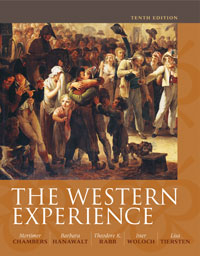1 A) the professionalization of entertainment. B) the institutionalization of leisure. C) the regionalization of amusements. D) the attainment of majority literacy in most European states. E) women of all social classes took part in the world of mass leisure. 2 A) moderate groups, which worked for amelioration of the conditions of women's lives. B) women's trade unions, which fought for better pay and working conditions. C) radical groups, which sought fundamental legal and social equality. D) feminarchist groups, which sought to reverse the sex roles and subordinate men. E) social work organizations that employed many middle class women. 3 A) increased rights to property. B) a share in decisions affecting their children. C) a right to participate in public affairs. D) the right to vote. E) better conditions in the workplace. 4 A) criticism of contemporary society and its mores. B) depiction of the artists' subjective perceptions. C) expression of the artist's interior emotions. D) experimentation with abstract form and color. E) a harkening back to a bygone "golden age." 5 A) detrimental and destructive B) inevitable and beneficial C) unneeded and preventable D) beneficial only if unregulated E) harmful over the long run 6 A) more moderate rhetoric combined with more moderate policies. B) more moderate rhetoric to mask their radical policies. C) a combination of radical rhetoric and moderate policies. D) a combination of radical rhetoric and radical policies. E) less and less influence in the trade unions movement. 7 A) that it put too much emphasis on the individual. B) that it was indifferent to moral issues. C) that it failed to uphold the rights of property. D) that it put too much emphasis on material things. E) the expanding role of the state in education and welfare. 8 A) Sorel, who rejected bourgeois rationalism in favor of violence and the will. B) Bergson, who rejected reason in favor of feelings, spontaneity, and common endeavor. C) Nietzsche, who attacked its Christian "slave morality" and emphasized will and uninhibited supermen. D) Thiers, who argued that liberal civilization would have to adopt the violence of its foes to defend itself. E) Marx, who criticized states' lack of revolutionary daring. 9 A) that Jews were identified in the popular mind with the dislocations and inequities of modern society. B) that a secret Jewish congress had met to organize a conspiracy to take over control of the world. C) that crude adaptations of Darwinism gave a false veneer of scientific respectability to ancient antipathies. D) that conspiracy theories gave concrete and simple explanations for the baffling pace of social change. E) partly-continued centuries-old prejudices, but with a modern veneer. 10 A) in urban areas among the new population of factory workers. B) in urban areas among men. C) in rural areas among men. D) in urban areas and among women. E) in rural areas and among women. 11 A) reducing radicalism in the mainstream political establishment. B) transforming the Whigs into the Liberal Party. C) making the Tories into the Conservative Party. D) preventing the acceptance of universal male suffrage. E) extending the right to vote to all men who paid property taxes. 12 A) the suppression of the Paris Commune. B) the founding of the Third Republic. C) the restoration of Charles X's Bourbon monarchy. D) the restoration of Louis Philippe's Orleans dynasty. E) a declaration of war against Prussia. 13 A) the conservatives lost prestige when it was shown that they were vilifying an innocent man. B) the liberals lost prestige when it was shown that they were defending a guilty man. C) the conservatives lost prestige when people realized that they were acting out of anti-Semitism. D) the liberals lost prestige when people realized that they were defending a Jew. E) it provided conservative activists with a unifying issue. 14 A) it had a conservative monarchy, which grew frustrated that power was held by the liberal parliament. B) it had an increasingly liberal parliament, but ultimate power was held by the conservative monarchy. C) it had never been resolved where ultimate power lay: in the hands of the parliament or the monarchy. D) it was so dominated by conservatives that it refused to make any concessions to businessmen or workers. E) a military cabal made both domestic and foreign policy for the nation. 15 A) high tariffs. B) an overseas empire. C) the military. D) heavy infrastructure development. E) the extension of social welfare programs. 16 A) the Social Democratic party became the largest in 1912. B) the labor unions had 2.5 million members in 1912. C) the Social Democrats were secure enough to adopt Bernstein's moderate policy. D) the Social Democrats sustained an extensive workers' subculture. E) the Social Democrats maintained their own newspapers. 17 A) was elected by the wealthy and had to cut deals with special interests to keep its parliamentary majority. B) was committed to modernizing the nation while balancing the budget. C) found it necessary to become increasingly restrictive as time went on. D) continually faced disasters in foreign policy that distracted it from domestic affairs. E) was dominated by a military leadership that was out of touch with the citizenry. 18 A) the ignominious defeat by the Japanese in the Russo-Japanese War of 1904. B) "Bloody Sunday," the incident that touched off the Revolution of 1905. C) a general strike that brought the nation's economy to a standstill. D) the Fundamental Laws, which were a list of demands by liberal elements for concessions by the Tsar. E) mutinies in both the army and navy. 19 A) parliamentary institutions. B) organized parties. C) an increase in the use of the mir system. D) reformed education and administration. E) rapidly increased industrialization 20 A) stalemated. B) progressive. C) regressive. D) vigorous. E) weak.





